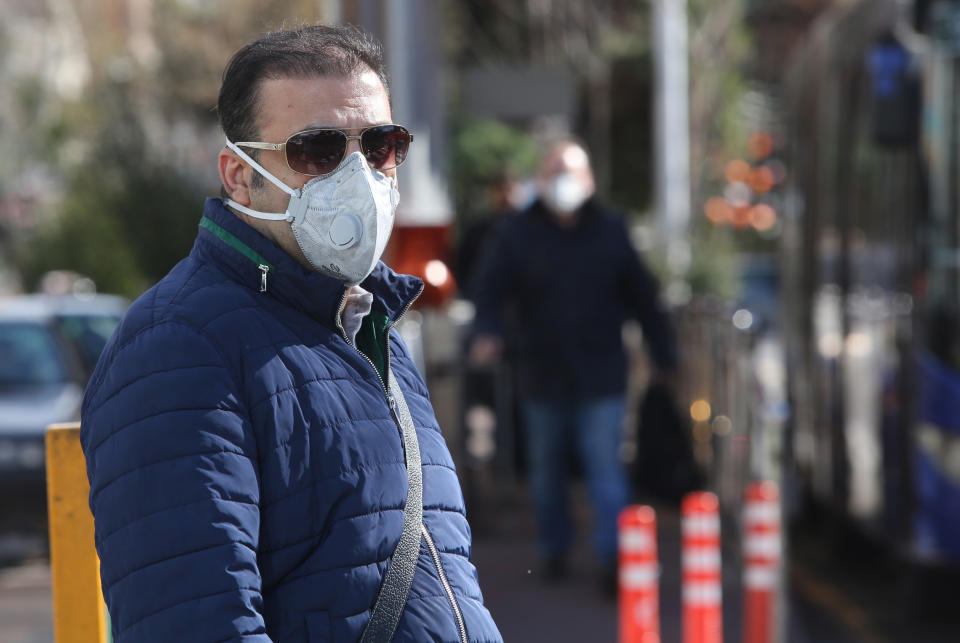Do face masks actually help prevent coronavirus?
Looking for more of the best deals, latest celebrity news and hottest trends? Sign up for Yahoo Lifestyle Canada’s newsletter.

With the coronavirus spreading and public concerns over contracting COVID-19 — the illness it causes — growing even faster, more people are donning masks in an attempt to stay healthy.
Celebrities are helping fuel the trend. Kate Hudson recently posted a selfie of her masked face with the caption “Travel. 2020.” Selena Gomez and model Bella Hadid have also shared similar looks on social media.
Steve and Marjorie Harvey opted for bedazzled masks on a recent first-class flight, while Brody Jenner and Gwyneth Paltrow chose more industrial-looking masks than your everyday drugstore variety.
“Paranoid? Prudent? Panicked? Placid? Pandemic? Propaganda? Paltrow's just going to go ahead and sleep with this thing on the plane. I've already been in this movie,” the GOOP executive noted on Instagram, referring to the 2011 hit “Contagion.”
We know how much influence stars have, and those who are otherwise healthy and using masks are perpetuating a medical myth.
Not a single health organization has recommended that healthy people wear surgical masks, N95 respirator masks, or other types of masks. In fact, doing so may give people a false sense of security.

Canadian health officials have repeatedly said that wearing masks is not part of official coronavirus recommendations.
Ontario’s chief medical officer of health, Dr. David Williams, says that doing so could even make matters worse.
People might be inclined to touch their face more to adjust the mask or to take it on and off to eat, increasing the risk of contracting the virus. Then, there’s the fact that a mask used repeatedly or incorrectly could be a breeding ground for germs; no matter how heavy-duty it might look, a mask can easily become contaminated. (We’re talking to you, Gwyneth.) Masks also need to be changed frequently and fitted properly to provide adequate protection.
“We’ve never recommended wearing a mask in public,” Williams said at a recent media gathering. “One of the problems with wearing the mask…is people wearing the mask then put their hands on the mask or touch their mouth....It may give that person some solace, but it’s more important that you don’t put your hands up to your face and mask. The mask may not be cleaned on a regular basis so you actually may be recirculating stuff.”
ALSO SEE: The biggest mistakes you're making while washing your hands
“In the hospital, they’re very strict about how people wear them, change them and handle them, put them on and take them off,” he adds. “It’s not just a piece of clothing; it’s used for very specific purposes in a very specific timeline and disposed of and handled accordingly.”
The U.S. Centers for Disease Control and Prevention has stated that in healthcare settings, patients with flu-like symptoms or those who have recently travelled to infected areas of China, should wear surgical masks. This lowers the risk that a potentially infected person could spread the coronavirus to others via saliva or phlegm.
Healthcare workers who are in contact with infected patients are to wear masks to reduce the risk of transmission. Unlike celebrities and members of the public, healthcare workers using N95 respirators are required to undergo a “fit test” every year to ensure they know how to use them properly.
The use of masks in healthy people could lead to a shortage, potentially contributing to the spread of the virus. In the United States, there have been reports of price gouging with so many people rushing out to stock up.

“We need to make sure those N95 masks are available for the doctors and nurses that are going to be taking care of individuals that have this illness,” CDC Robert Redfield said during a recent House Foreign Affairs hearing. “And it really does displease me, to find people going out, there is no role for these masks in the community.”
If you are a healthy individual, the use of a mask is not necessary. Other preventive measures will do far more to protect you from getting sick.
Cameron McIntyre, doctor of naturopathic medicine at North Vancouver’s Restoration Health Clinic, says he’s getting lots of questions from concerned patients about whether they should be wearing a mask. However, he stresses that viruses can still enter through masks. That’s not the only reason they aren’t effective for healthy individuals.
“We think about our mouths and noses as place of entry and exit for viruses, but they can also come in through the membranes of eyes and ears,” McIntyre says. “People are anxious and nervous, but prevention really starts with fundamentals or foundations.”
“That foundation is rooted in good food, clean water, proper sleep, and stress management,” he says, noting that the higher your stress level, the lower your immune defences. “If watching the news about the spread of the virus is stressing you out, it’s not a good use of your time.”
ALSO SEE: How can coronavirus kill young, healthy people?
Proper hand washing is essential to staying healthy, McIntyre says. He recommends using real, plain soap rather than antibacterial gels. They get rid of beneficial bacteria as well as potentially harmful types.
McIntyre also recommends sufficient vitamin D intake — which can be assessed by a simple blood test — as well as vitamin C consumption.
Another strategy to keep well is spending time outside. A growing body of research shows the health benefits of fresh air and being in nature.
“Bugs of any sort tend to have a lot more challenge adhering to people outside than inside,” McIntyre says. “Getting out in nature regulates the immune system and boosts mood. There are all sorts of psychological and physiological benefits.”
Federal Health Minister Patty Hajdu also recommends simple strategies to avoid contracting the virus — steps that don’t include donning a mask.
“I think for Canadians the message is protect your health,” Hajdu said at a recent press briefing. “Wash your hands frequently. If you’re sick, stay home.”
“I would remind Canadians that it is flu season,” she added. “Get your flu shot. It will help eliminate the flu. It will also reduce the burden on healthcare, which we will want to be doing so that we can respond if there is an outbreak.”
Let us know what you think by commenting below and tweeting @YahooStyleCA! Follow us on Twitter and Instagram and sign up for our newsletter, coming soon.



